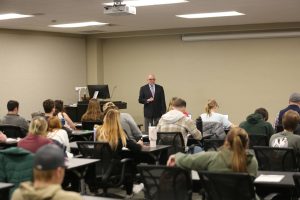As a child, Steward T.A. Pickett would travel to various Boy Scout camps with his father, who served as a unit leader. While Pickett would participate in a handful of organized activities, he was also free to do his own exploring since he wasn’t part of a troop. It was during those excursions that he found his passion for ecology.
Pickett has spent his career as an ecologist and is currently a distinguished senior scientist at the Cary Institute of Ecosystem Studies in Millbrook, New York. He recently spent a few days at the University of Missouri as part of CAFNR’s prestigious Executive-in-Residence Program.
“I felt very honored to be asked to participate in this program,” Pickett said. “It was very exciting to meet with so many faculty, staff and students. I particularly enjoyed talking with the undergraduate students and sharing my story with them. They’re at a very important time in their careers, and it’s really nice to be asked what you think.”

Pickett earned his bachelor’s degree in botany from the University of Kentucky and a PhD in botany from the University of Illinois Urbana-Champaign. After earning his degrees, he served as a professor at Rutgers University before joining the Cary Institute of Ecosystem Studies in 1987.
“My mother was a librarian and would bring home all kinds of books for my brother and me,” Pickett said. “I would read about a variety of topics, such as geology, astronomy or ecology. Books related to ecology took me back to the time I spent wandering through the woods, turning over rotten logs, looking under rocks and walking in the streams. That always felt natural to me, and it was a revelation to me that I could have a career related to this field.”
Pickett’s expertise focuses on the ecology of plants, landscapes and urban ecosystems. He received the Ecological Society of America’s 2021 Eminent Ecologist Award and is a member of the National Academy of Sciences. Pickett was the founding director of the Baltimore Ecosystem Study and co-directed the Urban Sustainability Research Coordination Network.
“I’ve had an absolute blast throughout my career,” Pickett said. “I’ve had so many great opportunities to take part in seminars, meetings and projects, as well as travel to 20 countries. As someone who enjoys learning about places, it’s been a joy to see those spots first-hand. Those experiences have been important for the development of my thinking and my approach.”
The Executive-in-Residence Program was envisioned and endowed by the generosity of the Robert O. Reich family. This one-on-one interaction offers a rare life experience for students and the Executive-in-Residence. Through class lectures, roundtable discussions, one-on-one meetings and other informal interactions, students learn first-hand about career paths and choices they may not have dreamed possible.
The program, inaugurated in February 1997 by faculty and staff as a collaborative learning experience for students, takes place in an informal environment that allows participation to be spontaneous and infectious.
Pickett met with a handful of classes, including soil morphology and environmental horticulture.
“The students I interacted with spanned such a great range of interest areas,” Pickett said. “It was exciting to have a variety of conversations with them, and I really appreciate the educational focus that MU has on the environment and natural resources.”
Pickett shared a lot of advice with CAFNR students, highlighting the variety of careers that ecologists can pursue as well the importance of thinking outside of the box.
“I think there is an assumption that if you pursue a ecology career path you have to be a professor,” Pickett said. “You definitely can be! But I wanted to make sure CAFNR students understood that they can be engaged with so many careers. It’s also important for them to be thinkers and realize that there will be plenty of problems they’ll confront that they didn’t learn from a classroom exercise. There are several other skillsets that they need to be familiar with, too, such as writing and communicating.
“I hope that what I shared was valuable as the students continue their education.”